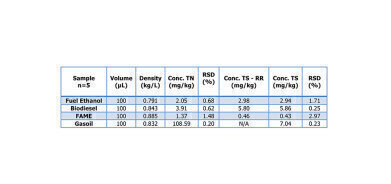Analytical Instrumentation
New liquid autosampler improves performance and reduces workload
Jul 31 2020
Run your liquid sample analyses completely unattended with Trace Elemental Instruments’ XLS-30, a unique automatic sampling and injection device that reduces your workload and improves analytical consistency. The autosampler has been designed to offer the best balance of quality and affordability that perfectly fits the requirements of liquid applications according to international test methods such as ASTM, DIN, ISO, and UOP.
The XLS-30 is set up to work with 2 mL vials from a 30 position sample tray. Analysis time is determined dynamically based on the selected sample volume and customized methods are available for specific application requirements. Due to the unique design of the XLS-30, the sample is dispensed with high accuracy and the needle is rinsed with a selectable volume of solvent. Since the sample never gets in contact with the syringe, cross contamination is eliminated. The system status is indicated by an LED strip and performance parameters are continuously monitored in TEIS Software. Calibration sequences are created effortlessly by the auto-dilution function and related software wizard. Rely on the robustness of the XLS-30 and improve your analytical performance!
The XLS-30 aspirates a pre-defined sample volume with high accuracy and volumetrically injects the sample material at a constant rate into the introduction module. The automatic sampling and injection device ensures uniform introduction of liquid samples into the direct injection- or boat module of the Xplorer Series or Xprep C-IC. The XLS-30 features a micro-liter syringe with large capacity (5 – 250 µL) and a versatile constant rate injector (0.5 – 30 µL/s). The XLS-30 forms a powerful combination together with the elemental combustion solutions of TE Instruments.
The XLS-30 combined with TE Instruments’ Xplorer-NS nitrogen and sulphur analyser provides excellent results in a short amount of time, as demonstrated by the sample table below. Obtained standard deviations are well below the repeatability limits (r), as stated in the ASTM D5453 for total sulphur and the ASTM D4629 for total nitrogen. Moreover, the results closely correspond to the mean concentrations of related ASTM D5453 Inter Laboratory Studies (ILS) in which TE Instruments participated.
Digital Edition
PIN 25.3 June/July
June 2024
Analytical Instrumentation - Recent Advances In Various Bench Scale Accelerated Oxidative Testing Methods For Fuels - Petrochemical Industry: Anton Paar Solutions Streamline Processes, Reduce H...
View all digital editions
Events
Jul 30 2024 Jakarta, Indonesia
Jul 30 2024 Jakarta, Indonesia
China Energy Summit & Exhibition
Jul 31 2024 Beijing, China
Jul 31 2024 Chengdu, China
Aug 05 2024 Moon Township, PA, USA


















